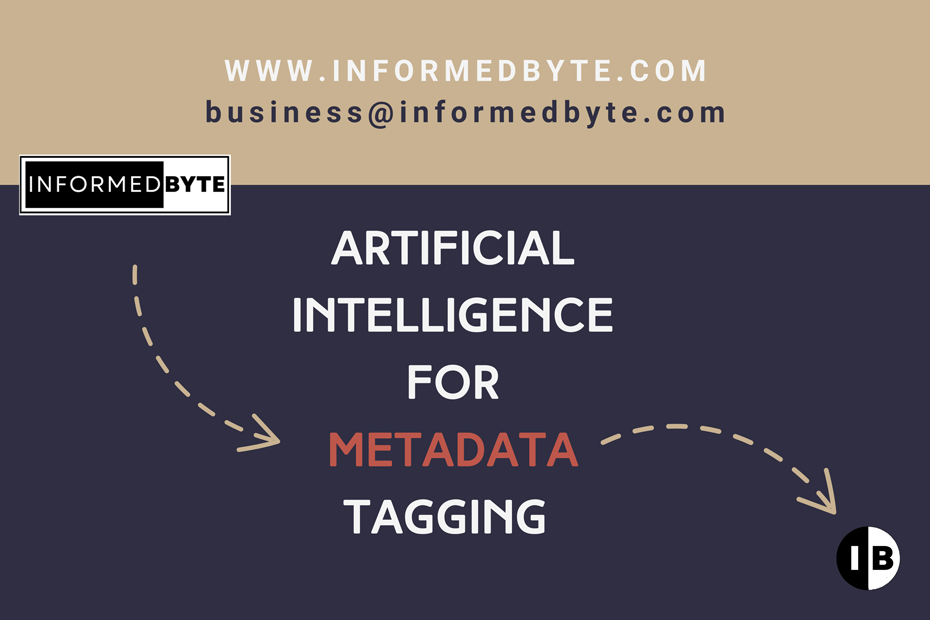AI for metadata tagging – It's your job to make it marvellous rather than messy.
June 24, 2025
In a world where digital content multiplies by the second, finding what you need—when you need it—depends on one often invisible element: metadata. The more digital assets you manage, the clearer it becomes that metadata isn't just helpful—it's essential. But let's face it: manually tagging every file, video, or document is tedious, time-consuming, and prone to human error. Fortunately, there's help on the horizon (and already in action): automated metadata tagging powered by AI.
But here's the key message from Informed Byte: AI will only take you so far. It's your job to make it marvellous rather than messy.

Image credit by Steve Johnson on Unsplash
Why Metadata Still Matters—More Than Ever
Whether you're curating internal knowledge bases, managing marketing assets, or building customer-facing content platforms, metadata is the backbone of structure, discoverability, and context. It tells systems—and people—what a file is, what it's about, and how it should be handled.
Without metadata, even the most valuable content can get lost in the digital shuffle.
Enter AI: Your Metadata Tagging Assistant (Not Replacement)
Automated metadata tagging leverages artificial intelligence (AI) and machine learning (ML) to analyse digital content and apply meaningful tags—quickly, consistently, and at scale.
AI can process text, images, audio, and video to identify:
Relevant keywords and entities
Sentiment or tone
Topics and categories
Contextual relationships between assets
This automation dramatically reduces manual effort and creates a foundation of consistency that's hard to achieve with human-only processes.
But let's be clear: AI doesn't replace human intelligence here—it augments it.
The Human Factor: Still Mission-Critical
AI can tag thousands of assets in minutes—but it doesn't know that the quarterly business strategy just shifted. It hasn't heard the stakeholder feedback from last week. It doesn't realise that two “similar” pieces of content actually serve very different purposes for your audience.
As highlighted in the Pew Research Center's 2023 report on digital life by 2035, experts caution against fully hands-off adoption of AI technologies. It's not all doom and gloom—but it's not a free pass either.
AI needs guardrails. It needs human oversight.
Your team's role is to guide, review, and refine the metadata tagging process—to inject context, correct nuance, and make judgment calls when the algorithm can't. Because AI doesn't understand business consequences, and it certainly doesn't have a sense of accountability.
Benefits That Go Beyond Speed
Automated metadata tagging offers more than just saved time:
Improved Discoverability: Well-tagged content is easier to find, driving better user experiences and faster access to relevant information.
Scalable Consistency: AI ensures that metadata is applied in a standardised way across vast content libraries—helpful for compliance, version control, and future-proofing.
Enhanced Personalisation: Tags fuel recommendation engines and content curation strategies, helping tailor experiences for different users and audiences.
Operational Efficiency: With AI handling the heavy lifting, teams can focus on higher-value strategic tasks, from content strategy to audience engagement.
But Let's Talk About the Caveats
While the benefits are significant, automated tagging isn't flawless:
Bias in Training Data: If the AI learns from biased or incomplete datasets, it can perpetuate those issues in your content tagging.
Lack of Context Awareness: AI might misinterpret tone, nuance, or evolving organisational priorities—leading to inaccurate or unhelpful tags.
Overreliance Risks: Blind trust in automation can result in metadata that's technically accurate but strategically off-base.
That's why ongoing quality checks, diverse training data, and clear governance are essential components of a successful implementation.
So, Where Does That Leave Us?
Automated metadata tagging is a game-changer—but only if it's used responsibly.
It's not about handing over the keys and walking away. It's about equipping your team with smarter tools—and knowing when to step in and steer.
At Informed Byte, we believe in hybrid intelligence: letting AI do what it does best (speed, consistency, scale), while humans bring context, critical thinking, and the strategic lens needed for meaningful content management.
So yes, AI can help you avoid the messy chaos of unstructured content. But only with your guidance can it truly become marvellous.
Let's get started
